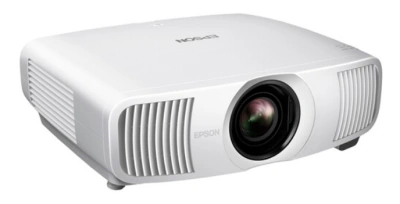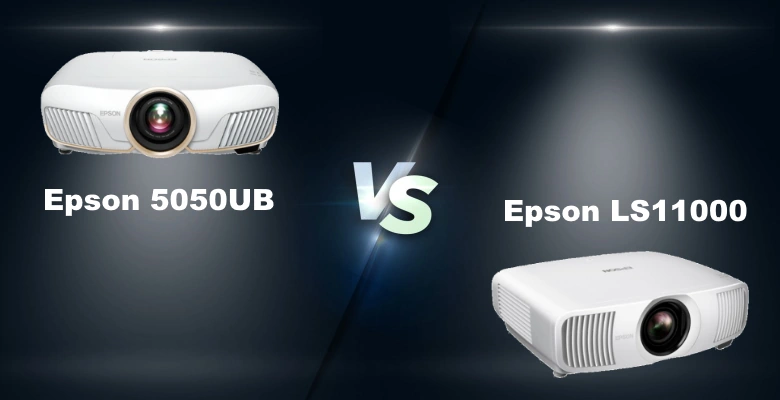Today’s modern projectors combine the latest in technology with sleek styling to provide unparalleled image quality in a variety of room configurations. The Epson 5050UB and the LS11000 both have similar technology on paper, but the Epson LS11000 comes out ahead in real-life scenarios despite the higher price tag (>>> Check on Amazon).
Epson 5050UB vs LS11000 Specifications:
| Epson 5050UB | Epson LS11000 | |
|---|---|---|
 |  |
|
| Resolution | 1920x1080 4K w/pixel shifting | 3840x2160 |
| Contrast Ratio | 1,000,000:1 | 1,200,000:1 |
| Brightness (Lumens) | 2,600 ANSI | 2,500 ANSI |
| Throw Distance | 10.3' - 29.4 | 10.3' - 29.5' |
| Screen size | 50" - 300" | 50" - 300" |
| Internal Speakers | No | No |
| Price | Find on Amazon ProjectorScreen.com Bhphotovideo.com | Find on Amazon ProjectorScreen.com Bhphotovideo.com |
Epson 5050UB vs LS11000 Feature Comparision
Epson markets both projectors as 4K-capable devices using pixel shifting technology to use a lower resolution chip set to enhance the image quality. The LS11000 is a newer design and uses a more advanced processor to provide a more true 4K resolution over the older 5050UB.
You’ll notice that the specifications for these projector models look similar. For instance, the 5050UB offers 2,600 lumens of brightness against 2,500 lumens advertised for the LS11000. The contrast ratios are also similar with the LS11000 offering 1.2 million-to-1 and the 5050UB providing 1 million-to-1 ratios.
Throw distance and screen size options are also identical between the two models, so neither one will be better for small spaces. They require anywhere from 10’3” to 29’4” to achieve screen sizes ranging from 50” to 300”. Most consumers aim for a screen size around 100” which requires about 14’ of distance from the lens to the screen.
The LS11000 has a lower and more stable input lag rating that is more desirable for gamers and people who watch action movies. Lower lag provides a smoother image that is free of stuttering.
Differences that Matter
The Epson LS11000 has several features the 5050UB lacks that make a big difference in the performance of these projectors. While both have advanced lenses, the LS11000 offers a better design to the 15-piece assembly that is designed to eliminate light leakage that provides a cleaner edge-to-edge image.
Real time scene adaptive correction allows the LS11000 to give you the cleanest, clearest, most correct image for each frame. This tech simply wasn’t possible when the 5050UB was released and the difference shows up when you are displaying big-screen images.
The Epson LS11000 supports HDR10+ and HLG (Hybrid Log Gamma) to ensure compatibility with the latest media sources. These technologies enhance the image quality to make movies and shows have more of the cinematic quality the director intended. The 5050UB is limited to HDR10 and may not be compatible with HLG.
Gaming Options
While the Epson 5050UB works well enough for older gaming systems, gamers who want to play the latest consoles will gravitate to the options available through the Epson LS11000. It offers refresh rates up to 120 Hz in 4K resolution for smooth action sequences. Lag times are as low as 20 ms so that gamers playing fast-paced titles won’t miss a beat. The LS11000 offers HDMI 2.1 connectivity for ARC and eARC signals that enable the projector to easily incorporate into a home theater audio video receiver.
Bulb Differences
An often-overlooked feature of projectors is the type of bulb the device uses. The Epson LS11000 uses a sophisticated laser array that will operate at 100 percent efficiency for as much as 20,000 hours. Laser bulbs offer a different type of brightness over bulb projectors due to the manner in which the light is produced making laser projectors the preferred option for people who are serious about getting the most accurate color and vivid images. The 5050UB is a bulb-type projector that will maintain good brightness for between 2,000 hours and 5,000 hours depending on the mode.
A significant difference between laser and bulb projectors is noise. While that might seem like a misprint, it isn’t. Bulb projectors run hotter which requires a more powerful fan to keep the sensitive electronics functioning safely. Since Laser designs put out significantly less heat than bulbs, the fan doesn’t have to be as powerful which leads to quieter operation.
Setup and Adjustment
Since both of these projectors have the same throw distance and potential screen sizes, you might expect that they are similarly simple to set up. Nothing could be further from the truth. The LS11000 offers a motorized lens that enables the projector to easily be adjusted to fit the image perfectly onto the screen. No such adjustment is available with the 5050UB so you’ll need to make manual adjustments.
Limitations
There are very few lacking features on these two projectors. One of the things you’ll notice right away is that neither design has built-in speakers so you’ll need to connect the projector to speakers. This can be done by using an ARC or eARC cable to a soundbar, AV receiver, or other audio option.
Why We Chose
We picked the Epson LS11000 over the Epson 5050UB because of the advanced technology it offers (>>> Find on Projectorscreen). The 5050UB is a great projector that will suit the needs of most casual entertainment aficionados, but there simply is no denying progress and the LS11000 exceeds the 5050UB in every meaningful category.
Individual Product Reviews
Below, we will break down the full specifications list for each of these two projectors and explain how the features enhance your viewing enjoyment.
Epson 5050UB

The Epson 5050UB projector offers stunning images that look almost as good as 4K. It uses a 3LCD chipset and advanced pixel-shifting technology to upscale non-4K content files without any evidence of rainbowing effects. A digital signal processor ensures smooth image production while HDR processing and extreme color gamut ensures full color production at professional levels.
The projector includes a unique lens design that uses 15 glass lenses and a special housing to ensure that all light is eliminated. By eliminating light leakage around the lens, the 5050UB is capable of maximizing the uniform color across the image.
It can be set up behind, in front, or from the ceiling to maximize the image for your space. Due to the moderately long throw distance, it is best when used in a more permanent mounting location. Follow the link for our full review of this projector: https://hometheaterabc.com/epson-5050ub-review/
Pros
- A good choice for consumers who typically watch movies
- Bright enough lens to function in rooms with some ambient light
Cons
- Lacks modern features and options including ARC/eARC
- Not a good choice for consumers who enjoy playing video games
Epson LS11000

The Epson LS11000 projector uses an advanced laser light and advanced processing features to display any content in 4K quality. The processor takes advantage of pixel-shifting technology to generate eye-popping image quality even in moderately well lit rooms. It is compatible with the latest HDR10+ and HLG sources so you’ll always get true-to-life colors and smooth sequences.
Epson upgraded the 15-piece glass lens system in this model to even further enhance optical clarity and seal out unwanted light penetration that causes image distortion. Full support for three-dimensional color also ensures that your image will never have a rainbow effect and colors will stay solid all the way to the edges of the screen.
Setting the projector up is made easier with a motorized lens adjustment which makes this an excellent choice for portable purposes, like setting up in different rooms, outside, or anywhere else you want to watch something on a big screen.
Pros
- Superior projector option for video gaming consoles and live sports
- Features the latest compatibility with ultra-high definition content
Cons
- Requires a fairly large space to get true big screen capabilities
- Not a stand-alone design -requires connection to a speaker system for sound
Frequently Asked Questions (FAQs)
The native resolution of the Epson LS11000 is rated at 3840×2180, making it a true 4K projector. The 5050UB uses pixel shifting to convert a standard 1920×1080 resolution into the appearance of 4k.
How much do Epson 5050UB & LS1100 weigh?
The Epson LS11000 is a robust unit, and although it can be used as a portable projector, it weighs in at a hefty 28 lbs. The 5050UB is a little lighter at 24.7 lbs.
Do these projectors have Bluetooth functionality?
Neither of these projectors have Bluetooth connectivity.
